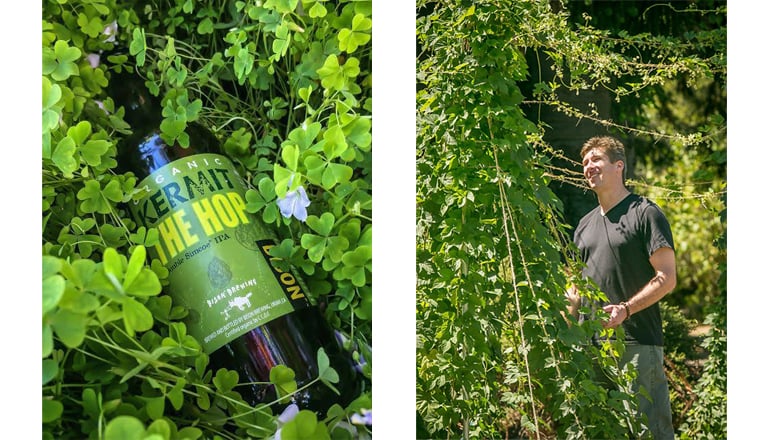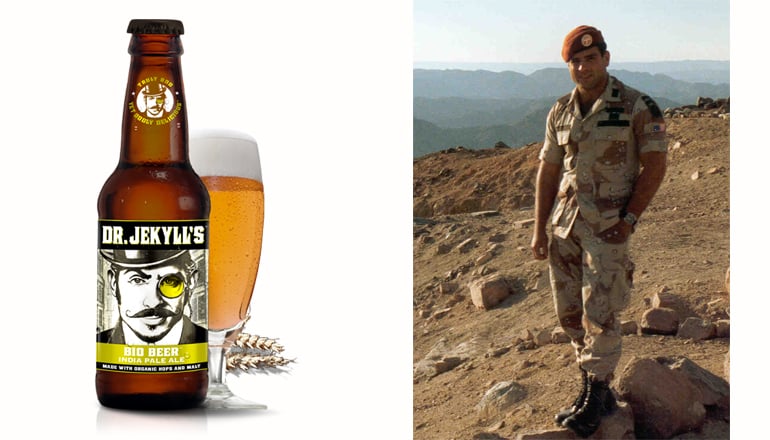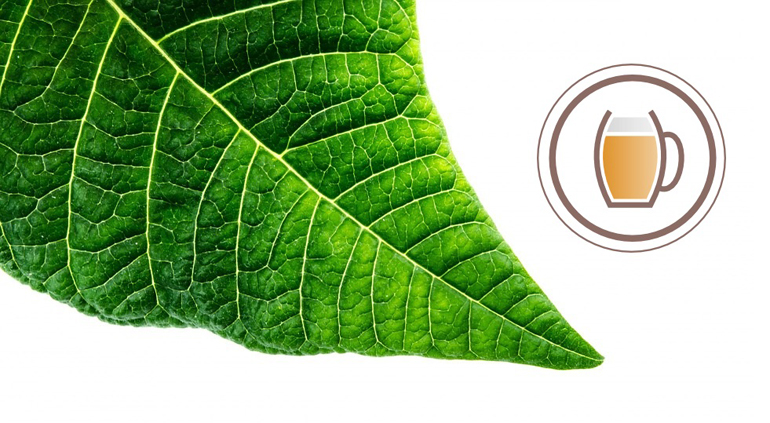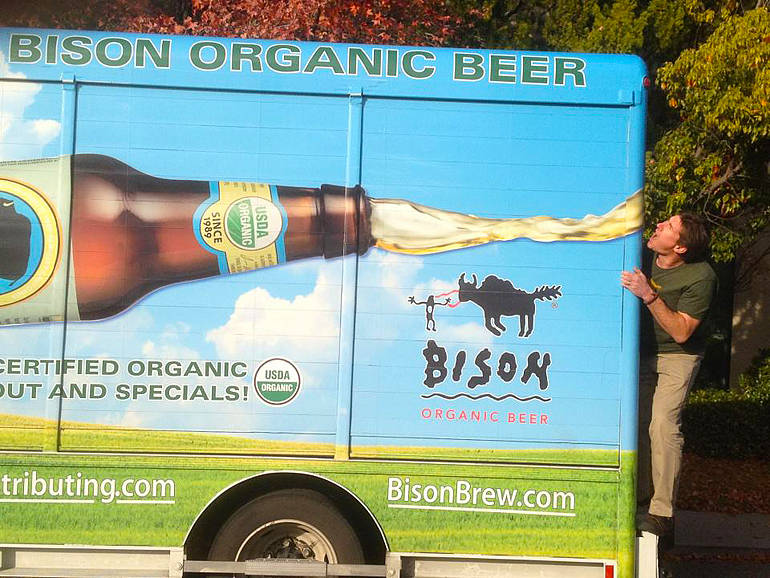Start 14-Day Trial Subscription
*No credit card required

What Makes a Beer Organic?
Organic goods can be polarizing. Are they actually healthier? Does the quality merit the price increase? Why are they so expensive in the first place? Add in the commodity level of organic goods to what is already a full-to-bursting commodity market – that of craft beer, and you have what some see as a recipe for disaster.
Many people see it differently. For some, it’s about health. For others, it’s about honesty and integrity.
While health may not be the main reason beer connoisseurs choose craft, honesty and integrity are key. In this piece, we’ll see what it means to be an organic brewer, and where organic brewing fits into the craft community at large.

Bison Brewmaster Daniel Del Grande stares hoppily at Kermit, which takes over three pounds of 100% organic Simcoe hops per batch. Photos courtesy Bison Brewery
The Good Old Days
If you think about it, all beer used to be organic. There were no chemical pesticides and fertilizers, and no certifications to distinguish oneself from “regular” products. Of course, those days are gone and to be organic is a distinction. So what does it mean?
USDA standards for organic beer are no different than they are for organic food: Beer ingredients must be grown without toxic pesticides and synthetic fertilizers in soil free from chemicals for at least three years, and genetically modified ingredients (GMO’s) are not allowed, according to Organicbeerfest.org. Within those rules, there are three levels of classification:
100% Organic: As the name suggests, the product uses 100% organically produced ingredients, excluding added water and salt. Any processing aids used must be organic.
Organic: Organic means the product uses at least 95% organic ingredients, excluding added water and salt.
Made with Organic Ingredients: The product uses at least 70% organic ingredients, excluding added water and salt. The product may contain organic and non-organic forms of the same ingredient, like hops and malts.
This sort of classification can get dicey. An uneducated consumer could be misled, in the same way “natural” products can still contain antibiotics, growth hormones, and other similar chemicals. A wily marketer can utilize certain classifications to their advantage.
But in the craft beer community, idealized and educated, you’d be hard pressed to find a small, organic brewer cackling while counting coins from confused buyers. For most, it’s about integrity, and control over the product.
Part of organic beer is about respect for the environment – organic farming is renewable farming. Man-made fertilizers and pesticides increase production to what is essentially an unnatural level. Soil becomes less viable over time, and may erode. It’s also about health, as toxic chemicals used for agricultural production can accumulate in water supplies and harm workers that come in contact with them.
It’s also about people. Organic brewers support local farms, and supporting local farms means supporting your community, which creates more jobs. Craft brewing was sold to the masses as authentic and local. As more of these brewers ascend to a higher echelon of production, we’ll see which breweries remain true to their communities and which will source from the lowest bidder. It’s a choice that limits production and increases overhead, but for the idealistic few, dreams trump dollars.
For some organic brewers it’s about doing classic brews with as purely sourced, local ingredients as possible, in order to leave as little of an impact on the planet as possible. Bison Brewery out of Berkeley, California is a classic example, all-organic since its inception, it was the first brewery in the world to earn B-Corp certification, in 2010. B-Corp certification requires meeting rigorous standards of social and environmental performance, accountability and transparency.

Founder and President Tom Costa is part of the all-veteran team behind Dr. Jekyll's "Bio Beer." Photos courtesy Jekyll's Craft Beer
For others, brewing organic is just the start. Take Dr. Jekyll’s Craft Beer, a Californian brewer that has become the “world’s first and only non-GMO, vegan friendly, craft beer made with organic hops and malt that is brewed with super foods in a synergistic way.” This brewery packs its wares with “superfood” ingredients, like the Beer Belly Kolsch, which layers acai berry, maqui berry, green tea, green coffee bean, raspberry ketone, and grapefruit fiber on top of its organic Perle and Cascade hops and organic malt bill. It’s part health, part beer, and all business-savvy.
"We've taken three high growth markets – craft beer, organic and nutraceuticals – and combined them into one product," said Tom Costa, president & CEO at Dr. Jekyll's in a Fortune interview.
The first organic brewery was founded in Germany, in 1980. Pinkus-Mueller brewery in Muenster went organic in reaction to declining quality of barley malt grown with chemical fertilizer, and by 1990, word spread to the US. Though the Brewers Association doesn’t treat organic beer as its own category, it’s currently almost an $80 million market in the US alone.
You may not always be able to taste a difference in organic goods, but often you can. In my experience, there’s no comparison between organic fruit and standard supermarket GMO-fare – organic’s got half the size and twice the flavor. In a world blinded by its desire to consume as much as it can as fast as possible, those who are brewing organic are setting an admirable example that anyone could emulate, and everyone benefits from.
As environmental concerns become increasingly apparent, and the burden of land management falls to the individual, organic is more relevant than ever. Yes, they’re slightly more expensive, but with good reason. That price increase represents more work for your neighbor, and tastier, healthier ingredients in your glass.
The craft movement has prided itself on authenticity, but has yet to fully recognize and embrace organic industry and the ideal it champions: leaving land that can produce beer long after we’re gone. The craft vs. macro dynamic has been diluted by acquisitions and growth, but one that will never change is business values over plain old value. If you see an organic beer on tap, give it a try. Even if you can’t taste a difference, the knowledge that you’re doing your fellow man a solid will make it go down that much sweeter.




